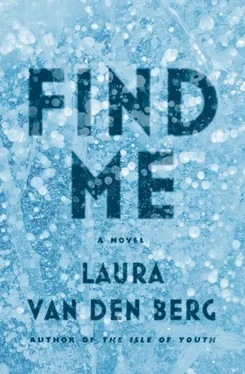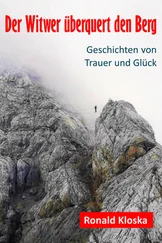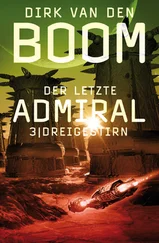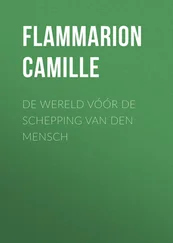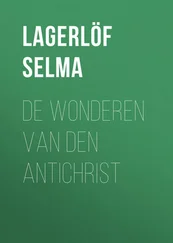“So,” he says. “That’s my story about Florida.”
I can tell from the way he talks about his sister that she is dead too, but I don’t ask.
Next the man tells us his theory of the sickness. He thinks it’s something the government did to weed out the weak, the citizens that have been holding this nation back, the citizens they no longer wanted. To harm America in order to save it. A controlled burn, like firefighters do with forests, except of course this did not stay in control.
“Save America from what?” I ask. Earlier he shared a jar of peanuts with us. Now my mouth is dry and my fingertips are pebbled with salt.
He does not answer. My sister was not weak, I know he is thinking.
“I was standing in my yard in Greenville when I saw these planes pass over,” he tells us. “There were six of them, all military, and they were spraying something on the fields. A light, fine mist. I went inside and closed the blinds. I stuffed towels under the doors. I sealed up the cracks. When I saw those planes, I knew in my heart this sickness was something they were doing to us.”
He does not answer. He pounds his fist against his chest. The semi drifts toward a silver guard rail.
We did it to ourselves or someone did it to us: that is how all the theories break down.
A heavy rain is falling and we can’t see the road ahead or the highway signs or other cars. The windows look like they’re melting. The darkness around the headlights is immense. We have no way to monitor our situation, to know if this man is really taking us to Florida or someplace of his own design.
Later I watch Marcus sleep. His hands are folded in his lap. His head lists to the side. I can still see the boy inside him when he sleeps.
I wonder if he loves that boy or if he wants to kill him and bury him deep.
The rain keeps coming. Lightning cuts the sky. Each time it looks like an explosion. The radio is on. I listen for something more about the Hospital, but there is only talk of the weather, which has turned strange everywhere: snow in Los Angeles, tornadoes in the mountains of Vermont. Volcanic activity in New Mexico, in the Sierra Blanca. A sinkhole that swallowed an entire neighborhood in Delaware. The station changes and someone is talking about a prehistoric forest that has been discovered in a faraway country, filled with petrified trees that have been dead for thousands of years. Trees are lucky: they do not have to worry about what they leave behind. I put on the gardening gloves and lie down in the cab. It is just me and this man, alone in the night.
“No one is waiting,” I think I hear him say. The rain makes it hard to tell. It sounds like we’re stuck inside a car wash.
“What?” I say, sitting up.
“What?” he says back.
* * *
In the woods behind the Mansion, Marcus took me to the spot where he set the raccoon free, just past the halo of trees, behind a large bush with shriveled berries hanging from the branches. The soil had been turned. We bent down and I saw the smooth milky edge of a bone. We were afraid to touch it; we used sticks to nudge it out of the dirt. It was unmistakably human, long and knobbed at the ends, a femur or a tibia. We pushed the bone back into the earth.
“There’s more down there,” Marcus said. “A lot more. A whole person, maybe.”
I leaned back on my heels. I crossed my arms and held on to my elbows. We didn’t say anything for a while. We just stared down at the soft ridges in the soil.
We didn’t know where the bones came from or who they belonged to, if the sickness or old age or Nelson or something else was to blame. It didn’t matter. We knew there wasn’t a cure for anything in the Mansion, or at least not a cure we could ever want. We knew it was time to stop being lost.
As I looked at the turned soil, I thought about how, if it weren’t for Rick, this was how the twins might have ended up, a secret in the earth for someone to find.
* * *
When we wake, the truck is parked in a field. I hear the swoosh of cars passing on the highway, but I can’t see the road. Marcus and I sit up at the same time. We yawn, stretch stiff arms, look around. I rub my face, brush rough crystals from the corners of my eyes. I roll my head in circles and listen to my bones crack. My neck is sore.
The rain has stopped, but recently: there is still water beading on the windshield. The engine is off and the keys are missing from the ignition and the driver is gone. His door is hanging open and when we get out, we find a cluster of footprints around the semi and a trail of flattened grass, leading out into the field.
Maybe the truck broke down. Maybe he needed to find a place to piss or jerk off. If we knew his name, we might have called it.
Instead we follow the trail into the field. We cannot resist the dewy grass or the lush canopy of trees in the distance. All that aliveness.
In the canopy, we hear a rustling and look up. There are children in the trees, maybe a dozen. Some are nestled in the treetops. Others lie flat against the branches, their slim legs and arms wrapped around the wood. They are wide-eyed and silent, waiting for the danger to pass.
Did the driver look up and see these children too? Is this what lured him away?
We wave at the children. They don’t wave back.
“Come down,” Marcus says. “We won’t hurt you.”
The children don’t move from the trees. They have heard this line before.
We start back to the highway. We pass the truck. There is still no sign of the driver. According to the road signs we are near Birmingham, back in Alabama, and now signs for Birmingham mean we have been going in the wrong direction, just as wrong as Centralia.
From the road, we try to find our next ride, and it is just as Rick said. One person is easy to pick up, especially if that person is a woman, especially if the driver is the kind who does not see a woman standing on the side of the highway, but prey. Two people is more complicated, especially if one of them doesn’t want to show you his face. There is an air of danger about us. Together we might make a plan. Together we might have the power to overtake.
For a while, no one stops or even slows down. We drift a little too close to the highway and a car honks. A man with a beard rolls down the window and shouts something about rabbits that gets lost in the air. We stumble back into the bed of rock and thin green weeds.
We’re picked up by a choir bus. It’s an old GM, shaped like a bread box, the pink paint stained with rust, something from another century. Inside we find a flock of men and women in white robes. The only empty seats are in the very back. As we walk down the aisle, these people reach out and touch us. Their fingers are hot.
They tell us they are traveling across America. In each state, they stop someplace and sing. They started in Maryland and have been working their way through the south: Virginia, the Carolinas, over into Kentucky and Tennessee. After Florida, they are heading west, all the way to the salt flats of Utah and the deserts of California and then north, to Alaska.
They tell us about the highway that leads to Alaska. It runs just over 1,400 miles, passing through British Columbia and the Yukon and the Delta Junction. It ends in Fairbanks, near the North Pole. Do we have any idea how cold it is in the North Pole? The highway was built in 1942, during the war. Before, you could only reach Alaska by water, which made the state feel like it was not part of America, but free to be its own country. From the windows of the bus, they expect to see bears and caribou and wolves.
They want to keep going past Fairbanks, to a place called Deadhorse, on the Beaufort Sea. They tell us they will sing to the animals, if there’s no one else to listen. They will not be afraid of the wild.
Читать дальше
